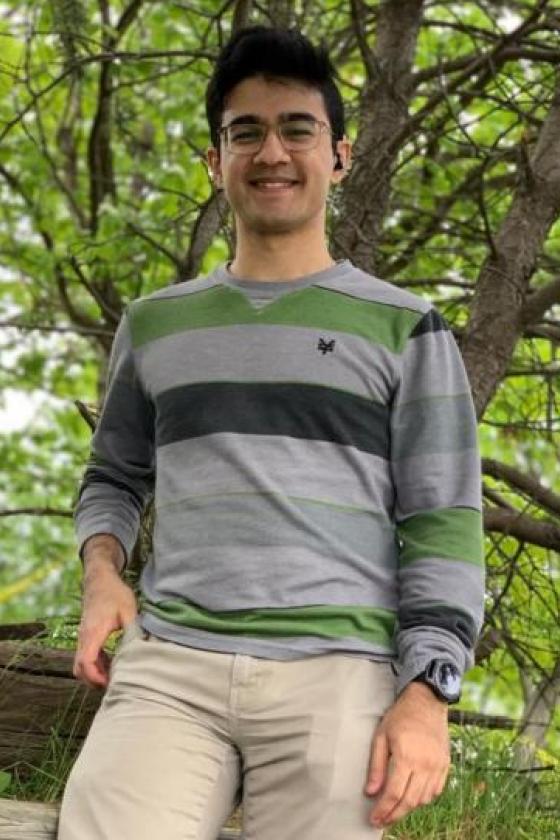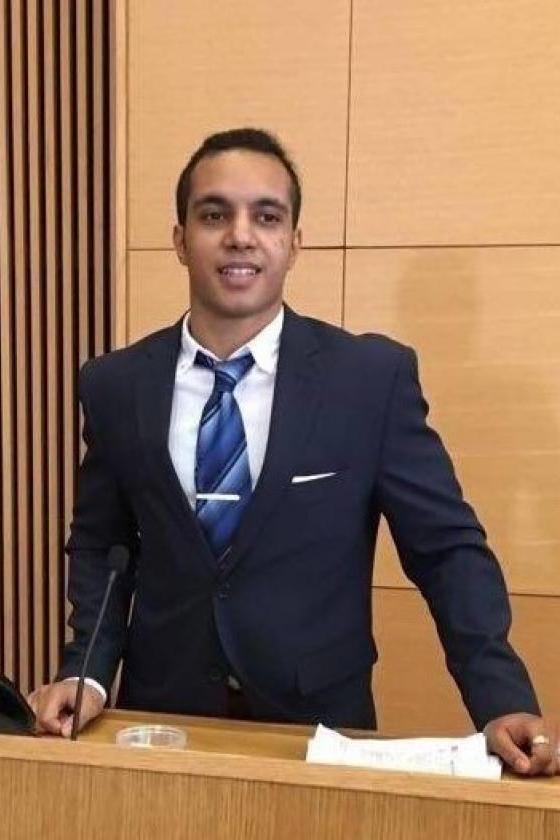Students

Rohail Ahmad
Anthropology Specialist, 2019
Why did you decide to study anthropology at UTSC?
I chose a major in socio-cultural anthropology as a placeholder/potential interest POST as I has been briefly introduced to it in grade 11 and found it interesting enough. After a few courses in both the evolutionary and sociocultural courses it grew on me, landing a sweet spot between academic-enough yet not a field that failed to engage me, so I chose to keep the POST. I was under the impression that I could double major in the Evolutionary and Sociocultural Anthropologies for my bachelor's. I later found that I had to choose only one, so I chose the B.Sc as it was a bit closer to what I thought would appeal to the grad schools I'd be applying to.
What is your favourite part about the anthropology program?
What I love about the Anthropology program is, again, the sweet spot it hit for me. In the evolutionary field, it was fun and not too overwhelming a science to get into. It introduced me to many scientific fields without getting daunting, such as geology, biology, ecology, musculoskeletal anatomy, and even a tiny bit of astronomy. In the sociocultural field, not to sound cliché, I truly felt that the insight into cultures from around the world, and a critical look at the biases we come to accept gave me plenty to think about and help put things into perspective. It dispelled a lot of illusions for me about people from around the world - what may look like poverty to us is a way of life that works for others, yet others put on a guise of poverty and what looks like "backward" living for their own profit. Not every population aspires to a Western lifestyle, and there is no such thing as a pristine tribe of humans untouched by globalization and modernity.
Any advice for new anthropology students?
Several things I always tell everyone, especially if they're going into anthropology:
- Regardless of whether you’re specializing in sociocultural or evolutionary anthropology, get ready to take a lot of the other field's courses up until the very end of your bachelor's. That's just how the credits work out. You’ll have to face your fears if you don’t like humanities or science reading and writing.
- This applies to all avenues of life, but don’t assume you’re better than the extra help available to you. The professor’s and TA’s office hours are there for a reason. They’re the ones marking your work and it’s only fair you know what they expect and how to best approach it. My professors at UTSC were very kind and down to earth people, and helped me out a lot every time I asked for it.
- You’re not realistically going to get your work done if you don’t do it efficiently. You hear this a lot but this is coming from someone who just went through it – university will take up as much time as you give it. You will be assigned roughly 60 to 80 pages of readings by each anthropology course every week. If you’re taking a full course load and try to take in every detail on every page front to back, you’ll end up learning nothing and waste all your time, and eventually get sick of studying. There is a correct way to read humanities and science, and it often means learning the main takeaway of the reading as it informs the weekly theme and any details that support it. Ask your TA’s or professors about this, they’ll tell you what this means.
What’s next for you after graduation?
I am going for a Masters in User Experience Design in the downtown campus. There was a 4-year bachelor’s prerequisite for it, and Anthropology is what got me there. I could not have remained a good student and done as well as I did were it not for Anthropology hitting that aforementioned academic sweet spot for me. If I were a more academically inclined person, I’d have without a doubt chosen a future in Anthropology.

Mackenzie Cakebread
Anthropology Specialist, 2019
Why did you decide to study anthropology at UTSC?
Like a lot of students, I discovered anthropology by accident! I took both introductory courses in my first year at UTSC and fell in love with the discipline, so I switched my major from English to Socio-Cultural Anthropology. It was a combination of a lot of the things that I love (storytelling, history, geography, cultural studies, etc.) while also being really stimulating academically.
What is your favourite part about the anthropology program?
The community! Anthropology is a relatively small department and as you continue to take courses the class sizes get smaller and smaller. That meant I was able to form really great relationships with my classmates but also my professors, which really enriched my university experience. I was able to go to my professor’s office hours and just chat about life, other classes, and things happening in the world because the community is so open and welcoming.
Any advice for new anthropology students?
Be prepared to be wrong. The best anthropology classes are the ones where students are empowered to lead discussions, even though it seems scary at first. Participate in your classes, do your readings, and remember that no one knows everything! Sometimes you’ll have the wrong answer or ask a stupid question, which can be embarrassing (trust me), but every mistake is a learning opportunity.
What’s next for you after graduation?
In July I’ll be starting my first full-time job in sales as a Tour Consultant with EF Education First Tours. I never saw myself going into sales, especially as an anthropology graduate, but it combines all of the skills that were necessary for my success as an undergraduate: communication, critical thinking, patience, and determination. Plus, it means I get to travel and make the world my classroom.

Zarin Tasnim
Anthropology Specialist, 2019
Why did you decide to study anthropology at UTSC?
Anthropology was something I stumbled upon in my second year after I took an elective, more specifically ANTA02. After just one class, I was drawn to how different anthropology was from science, which I was studying at the time. After taking more classes, I fell in love with the ways anthropology familiarized the unfamiliar and unfamiliarized and familiar. I always tell people I meet for the first time that at any given moment, I will always start discussing anthropological concepts at length given the opportunity, because it’s a topic that always holds me interest.
What is your favourite part about the anthropology program?
My favourite part has been meeting and getting to know the faculty because I believe having mentors who are willing to guide and support you is a crucial aspect of being successful in your program. Anthropology is filled with a lot of complex ideas and concepts that are often difficult to unpack, however, visiting your professor’s office hours to ask questions and further discuss any issues that come up really help to ensure you understand what is being taught in class.
Any advice for new anthropology students?
With regards to the anthropology program specifically, make sure you are doing your readings on time and before class so you are able to discuss the material or any questions that you might have during class. In anthropology, especially higher level courses, the syllabus is often filled with long, dense articles and readings which require a lot of time to get through. Breaking them down and reading them throughout a couple of days is a much better strategy than cramming everything the day before a class, or an exam.
In terms advice on the university experience: get involved! UTSC has so many exciting clubs and associations for students to join. It’s a great way to meet people, to network, and most importantly to understand that there are aspects to life that lie beyond the classroom.
What’s next for you after graduation?
I will be starting my masters program in socio-cultural anthropology at the downtown campus next year. I am really excited to meet the faculty there and to be able to meet other graduate students who are as passionate as me about anthropology.

Miguel Waltoo
Anthropology Specialist, 2019
Why did you decide to study anthropology at UTSC?
I decided to study anthropology because I thought that it would be a discipline which would help me to improve my critical thinking skills and allow me to gain insights into the contexts of the world around me. I figured that this would provide me with a much deeper understanding of the lived experiences of individuals, which in turn would help me as a human rights lawyer that defends other, often vulnerable, people.
What is your favourite part about the anthropology program?
My experience as an anthropology student was so positive to the extent where I am unable to narrow it down to one specific part about the anthropology program as being my favourite. This is because, as I will talk about next, if I ever encountered a problem with an assignment, or even with my personal life, the professors were always there and always understanding and provided advice to help me. I am a very easy-going guy, so I usually do not complain about things, but generally, the assignments that I received during my time as a student were not too overwhelming, as long as you manage your time wisely.
Any advice for new anthropology students?
My advice to new anthropology students would be to manage your time-wisely, always start way in advance of the deadline and work your way at it. Even if you have writer’s block about the point that you are trying to make, just brainstorm more ideas and angles that you can attack your topic and build on them.
My next piece of advice would be to talk to your professors and build relationships with them, not only because they mark your assignments and exams or will write reference letters for you later on, but because the faculty in the anthropology department are some of the most caring, down to earth individuals who genuinely want to see you succeed in life. I did this and it opened so many opportunities for me such as getting hired as an Undergraduate Research Assistant by a professor that I got to know very well.
What’s next for you after graduation?
Now that I have graduated, I will be heading to the UK for law school. As I mentioned before, law school was my desired end goal from the start; though there were some times that I strongly considered going to graduate school as a result of my experience, but I decided to stay true to my original goal. This should be a testament to how great my experience was. However, I do plan on using everything I learned here to help me in the future as a lawyer.
If you are wondering whether or not you should pursue a degree in anthropology and would like to connect with me and I will answer whatever questions you have and provide you with advice if you like. Email: miguelwaltoo@hotmail.com